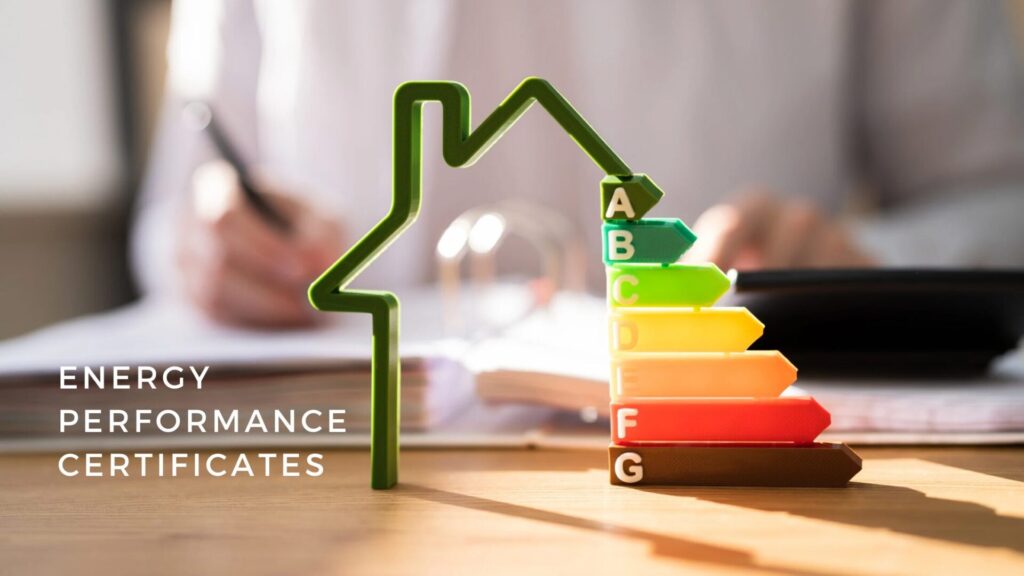If you’re thinking about selling a house, you may have come across the term “Energy Performance Certificate” or EPC. But what exactly is an Energy Performance Certificate? Why is it required to sell a property? In this blog post, we’ll break down everything you need to know about EPCs and how they can impact your property sale.
Understanding an Energy Performance Certificate
An Energy Performance Certificate, or EPC, is essentially a measure of how energy-efficient your home is. It uses a scale ranging from A, which represents the highest level of energy efficiency, to G, the lowest.
The certificate provides not only this rating but also detailed recommendations for enhancing the home’s energy performance. These suggestions aim to reduce energy use and, consequently, the costs associated with gas and electricity. The assessment to determine this rating examines various aspects of your property. Including its construction, heating systems, and insulation.
This is because each of these elements plays a crucial role in how energy is consumed and conserved within a home. It’s important to understand that the EPC offers a snapshot of how energy-efficient your property is now and its potential for improvement.
By following the recommendations given, homeowners have the opportunity to make strategic changes that could not only save on energy bills but also potentially increase their property’s market value. This aspect of the EPC is particularly valuable as it directly links energy efficiency with financial savings and environmental benefits. Aligning closely with contemporary concerns over the cost of living and environmental sustainability.
The Legal Requirement for an EPC

Photo by Iñaki del Olmo on Unsplash
In the UK, obtaining an Energy Performance Certificate (EPC) before selling a property isn’t just advisable; it’s a legal requirement. This obligation is based on legislation aimed at enhancing energy efficiency. Also, informing potential buyers about a property’s energy use and costs.
The law stipulates that a valid EPC, which is valid for ten years, must be presented to prospective buyers as soon as the property is put on the market. This ensures transparency and enables buyers to consider energy efficiency as a key factor in their decision-making process.
It’s part of the government’s broader initiative to reduce carbon emissions and make homes more energy-efficient. Failure to comply with this requirement can lead to penalties for sellers Highlighting the importance of obtaining an EPC early in the sales process.
This legislation underscores the government’s commitment to sustainability and provides a clear framework for sellers and buyers to engage in energy-efficient property transactions.
How an EPC is Issued
To issue an Energy Performance Certificate, a certified assessor needs to conduct an evaluation of the property. This process involves a thorough examination of various elements that contribute to the property’s overall energy efficiency. The assessor looks into the age of the home. Its construction materials. The type and efficiency of the heating system in place, and the quality of insulation among other factors. These elements are critical in determining how well a property conserves energy. It also helps identify potential areas for improvement.
During the assessment, the assessor uses a standard method to collect data on the property’s energy features. This method ensures consistency and accuracy across all evaluations. After gathering all necessary information, the assessor analyses the data to calculate the energy efficiency rating of the property. This rating is then documented in the Energy Performance Certificate. Along with recommendations for enhancing the property’s energy performance.
The entire process is designed to be straightforward and non-intrusive, with the assessment typically taking just a few hours to complete. Once issued, the EPC provides valuable insights into the property’s energy consumption and offers practical advice on how to reduce energy costs. This certificate plays a pivotal role in the property market. Influencing both the sale and purchase of homes by highlighting their energy efficiency levels.
The Cost of Obtaining an EPC
The cost of an Energy Performance Certificate (EPC) can vary, mainly depending on the size of the property and its geographical location. Typically, for most homes, the price of obtaining an EPC ranges from £50 to £120. This difference in cost is due to the diverse range of properties. From small apartments to large detached houses, and the varying levels of effort required to assess them. It is also influenced by regional pricing disparities across the UK. For example, obtaining an EPC in urban areas such as Daventry or Rugby may have slightly different costs compared to more rural locations.
Despite the cost, obtaining an EPC before selling your property is not only a legal requirement but also a wise decision. The insights provided by the EPC can offer significant long-term benefits. By identifying ways to improve your home’s energy efficiency, the EPC can help reduce future energy bills for potential buyers. This, in turn, can enhance the appeal of your property on the market. Additionally, demonstrating a commitment to energy efficiency can potentially increase your home’s value.
It is recommended to obtain quotes from certified assessors to get the best deal for your EPC. Remember, the cost of the certificate is minor compared to the benefits it brings in making your property more marketable and energy-efficient. Estate agents, particularly those familiar with the local market like Skilton & Hogg, can often recommend reputable assessors, making this process smoother for sellers.
How an EPC Affects Your Property Sale

Photo by Breno Assis on Unsplash
An Energy Performance Certificate can significantly influence the sale of your property. A property with a high EPC rating, indicating superior energy efficiency, can be more appealing to potential buyers. This is because it suggests lower future costs for gas and electricity, making the property more cost-effective to live in.
Consequently, properties with better energy efficiency often attract higher offers and can sell more quickly. In contrast, a property with a low EPC rating may be less attractive. Buyers may be concerned about the need for future investments to improve the home’s energy efficiency. This could lead to longer sale times and possibly lower offers as buyers factor in the costs of making energy-efficient improvements.
Additionally, the awareness of energy efficiency has increased among buyers, making the EPC rating a more significant consideration in their purchase decision. This shift in buyer priorities underscores the importance of the EPC rating in the property market. Hence, understanding how your property’s EPC rating could influence its sale is crucial. It highlights the potential benefits of investing in energy efficiency improvements before listing your property for sale, to enhance its appeal and maximise your return.
Improving Your EPC Rating
To improve your property’s EPC rating, focus on enhancing its energy efficiency. Starting with the heating system, consider upgrading to a more energy-efficient model. This could significantly reduce energy consumption.
Next, examine the quality of your home’s insulation. Loft and cavity wall insulation can prevent heat loss, making your property warmer and more efficient. Also, replacing old windows and doors with double or triple-glazed options can further insulate your home against heat loss and reduce noise.
Another area to consider is lighting. Switching to LED lights can lower electricity use as they are more efficient and have a longer lifespan than traditional bulbs. Additionally, if feasible, incorporating renewable energy sources, like solar panels, can drastically cut electricity bills and improve your property’s EPC rating.
Remember, each step taken to enhance energy efficiency not only contributes to a higher EPC rating but also to potential cost savings on future energy bills. This can make your property more attractive to buyers, as it promises a more cost-effective and environmentally friendly living space. Even seemingly minor improvements can have a significant impact on your property’s energy efficiency and its appeal on the market.
By implementing these changes, you not only work towards a better EPC rating but also invest in the future value and desirability of your property.
Finding a Reliable Estate Agent
Choosing the right estate agent is crucial in navigating the property market effectively. It’s advisable to select an agent who boasts substantial experience and a strong track record within your specific locale. An agent with local expertise, such as Skilton & Hogg in Daventry and Rugby, offers invaluable insights into the area’s property dynamics. They can provide tailored advice on how to present your home to potential buyers, including the importance of an Energy Performance Certificate (EPC) and ways to enhance your property’s appeal.
A proficient agent will assist in setting a competitive price, marketing your property effectively, and negotiating offers to ensure you secure the best possible deal. They should be well-versed in current legislation, including EPC requirements, and able to guide you through the process with clarity.
When selecting an estate agent, it’s beneficial to conduct research, read reviews, and perhaps most importantly, engage in a direct conversation to gauge their understanding of your needs and their ability to meet them. This initial interaction can provide a clear indication of the level of service and commitment you can expect.
In summary, the right estate agent will not only streamline the selling process but also play a pivotal role in achieving a successful sale, making the choice of agent a key consideration in your property selling journey. Call Skilton & Hogg Estate Agents today, Click here to find out more.




